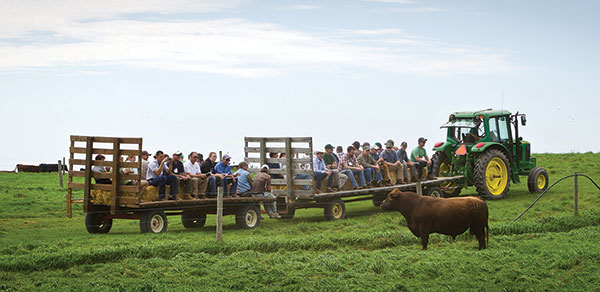
This past September marked the seventh anniversary of the Grassfed Exchange Conference, a meeting organized by its namesake to offer the latest, most valuable information about grass-fed livestock production, soil health and environmental quality to grass-fed producers. The 2015 meeting was held in Mount Pleasant, Mich.
Michigan State University acted as the local affiliate host for this producer-focused, three-day event offering the approximately 250 attendees a wealth of learning opportunities.
The Grassfed Exchange Conference is unique in that a mostly rancher-led board plans the meeting. As a “meeting for producers designed by producers,” the conference features activities and a speaker line-up geared towards providing attendees with real-world ideas, innovations and solutions that they can readily apply on the farm or ranch.
The theme for this year’s Grassfed Exchange Conference was “Generations of Opportunity: Sun and Water, Sons and Daughters.” Topics discussed included marketing grass-fed products, tips to improve forage and grazing management, challenges facing small to medium meat processors, farm and ranch succession, and issues pertinent to the connection between regenerative agriculture and human health.
The conference began with a full day of tours. The first stop gave attendees a behind-the-scenes look at Graham’s Organic Meats and Processing, an organic grass-fed beef and pastured poultry operation that also operates its own USDA-certified meat processing facility and organic poultry feed mill. Conference goers then traveled north to Michigan State University’s Lake City Research Center (LCRC) to hear research updates on grass finishing, forage utilization and outreach efforts.
The day ended with an evening workshop centered on budgeting for success in pasture-based agriculture. This session featured stimulating discussions on the current status of the cattle market, financial tips for producers from both a farmer and lender, and a budget case study of the MSU-LCRC cow herd.
The second day started off with a compelling talk on keys to profitably stacking livestock enterprises. Tips on how to maximize the solar collecting power of pastures and a discussion on the connection between good grazing management and improving soil health followed.
Valuable insight was gained when a local producer shared his family farm’s story of transition from a conventional row-crop farm to a grass-fed beef operation. The afternoon sessions ended with a roundtable discussion on grass finishing strategies applicable to the Upper Midwest.
The event closed with Defending Beef author, Nicolette Hahn-Niman, sharing the challenges producers face with consumers who may not always agree when it comes to food production.
The following award presentations were also given:
Innovative Grassfed Beef Marketer/Processor/Distributor Award — Mike and Rob Lorentz, Lorentz Meats in Cannon Falls, Minn.
Producer Award — Seven Sons Farm in Roanoke, Ind.
Terry Gompert Pioneer Award — Rod Ofte from Coon Valley, Wis.
The final day opened with a discussion on ways grass-fed producers and meat processors can work and grow together. Authors Mark Schatzker, The Dorito Effect, and Daphne Miller, Farmacology, shared their perspectives on the connection between food and human health, followed by a roundtable discussion on the future of the grass-fed industry. A panel dialogue on ranch succession brought the conference to a close.
Take-home points
Some of the key take-away points from the conference included:
- Stacking livestock enterprises is a proven way to generate more revenue per acre and offers young producers some versatile options when getting started.
- The many branded grass-fed beef programs that exist today offer many opportunities to cultivate multiple revenue streams.
- Holistic management was emphasized as a foundational learning tool vital to running a successful, sustainable pasture-based operation.
- Getting buy-in, especially from those outside the agriculture circle, is key when it comes to getting investors, understanding and having the ability to empathize with concerns and perspectives, and showing the value created in the product, as well as the product’s greater impact on society.
The 2016 Grassfed Exchange Conference will be held April 27 to 29 at the Georgia National Fairgrounds and Agricenter in Perry, Ga. Stay tuned for details at www.grassfedexchange.com.
This article appeared in the January 2016 issue of Hay & Forage Grower on page 26.
Not a subscriber? Click to get the print magazine.

